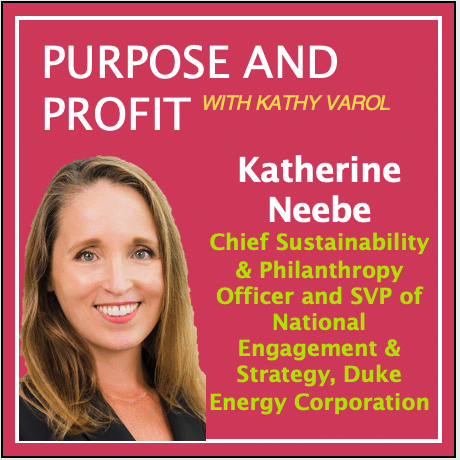Show Notes:
Katherine Neebe serves as senior vice president of national engagement and strategy, and chief sustainability and philanthropy officer for Duke Energy. She leads Duke Energy’s stakeholder engagement efforts to develop solutions to meet customer needs for continued reliable and affordable energy—while simultaneously working to achieve the company’s goal of net-zero carbon emissions by 2050.
In addition, Katherine maintains oversight of the Duke Energy Foundation, which provides philanthropic support to help meet the needs of communities where Duke Energy customers live and work.
In this episode we discuss:
✅ Nuclear power’s resurgence
✅ Modernizing the power grid
✅ The surprising reason the US power industry has been able to reduce emissions by 40%
3 episode takeaways (listen to the full episode for a lot more gems!):
1️⃣ Tipping Point Industries: Tipping points can be for the better or the worse. When it comes to creating a sustainable future, there are tipping point industries that can have an oversized impact on our collective emissions reductions.
The energy sector, for example, is foundational—it powers our lives and businesses. By making it sustainable, we create a massive ripple effect that benefits every organization and individual relying on it. Similarly, transportation is another cornerstone sector. Innovation in tipping point industries can profoundly impact our collective path to sustainability.
***
2️⃣ Energy: The Force of Transformation: Physics teaches us that energy cannot be created or destroyed, it merely changes from one form to another. This principle allows us to power entire cities by harnessing, transporting, and converting energy.
It got me thinking—what do you want to power with the energy within you? What do you want to build and sustain with your life force? Reflecting on how you harness your energy can lead to a legacy that outlasts you.
* * *
3️⃣ Levers for Change: Three levers for driving sustainability are: business, government, and philanthropy. These forces work together, to create combined change that’s more than the sum of its parts.
Like sustainability, most areas in life have multiple levers to create change, where a combined effort produces the best results. If there’s something in your life, or your business, that you want to change, take some time to consider what the levers of change are for that thing. Chances are, your best results will come from approaching change from multiple directions.
References:
- Connect with Katherine on LinkedIn
- Duke Energy
- The U.S. National Science Foundation page on the CHIPS and Science Act

